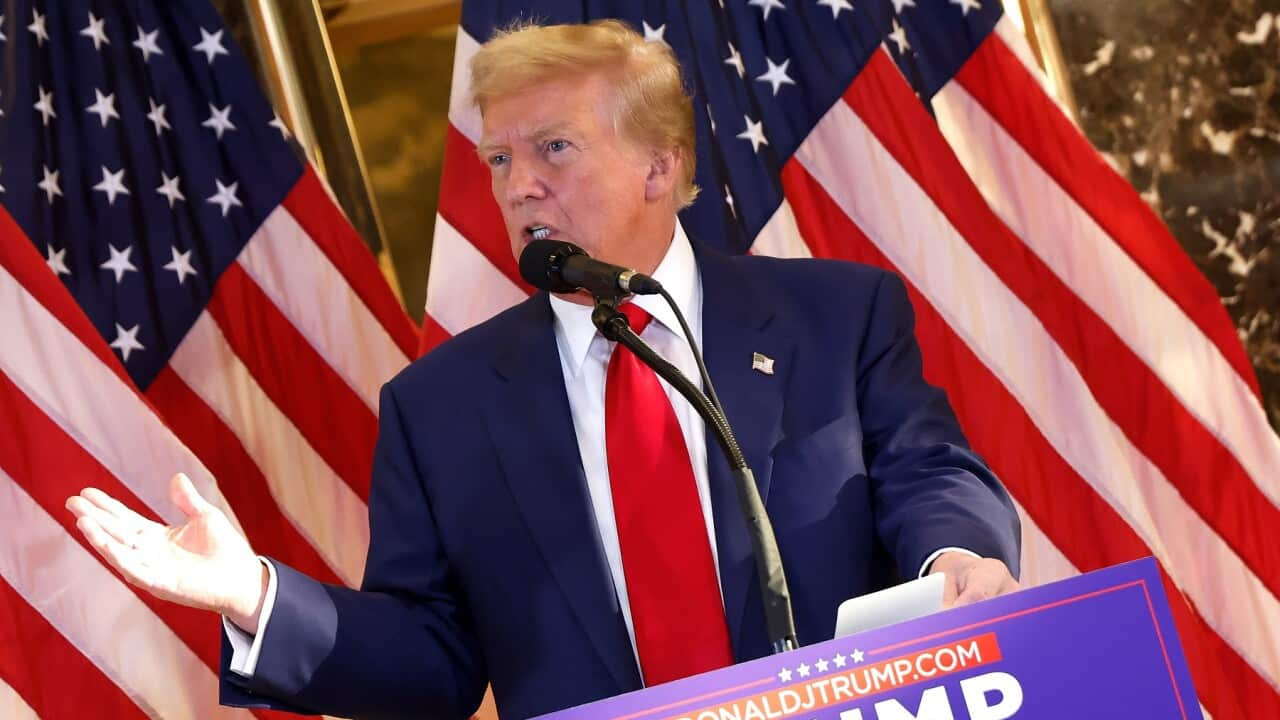TRANSCRIPT
Supporters of former U-S president Donald Trump applauded his arrival at the place where it all began, Trump Tower in Manhattan.
But the site of the announcement of his successful candidacy for the 2016 election was the setting for a markedly different occasion on Friday.
The presumed Republican candidate for the 2024 election had been newly inaugurated as the first ever U-S president to be convicted of a criminal offence, on 34 counts of falsifying documents in relation to a 2016 hush-money payment to adult performer Stormy Daniels.
In an unscripted, half-hour speech, Mr Trump criticised the trial, boasted of a boost to campaign donations, and announced he would appeal the verdict.
"If they can do this to me, they can do this to anyone. These are bad people ... It was a rigged trial. We wanted a venue change where we could have a fair trial. We didn't get it. We wanted a judge change. We wanted a judge that wasn't conflicted ... So we're going to be appealing this scam. We're going to be appealing it on many different things. He wouldn't allow us to have witnesses. He wouldn't allow us to talk. He wouldn't allow us to do anything. The judge was a tyrant."
Mr Trump once again attacked New York State Supreme Court Judge Juan Merchan, as well as Manhattan District Attorney Alvin Bragg.
He also repeated the unsubstantiated claims the trial, brought by state and not federal prosecutors, was masterminded by the White House to influence this year's election results.
"This should have been a non-case and everybody said it was a non-case including, Bragg said, until I ran for office and then they saw the polls. I was leading the Republicans, I was leading the Democrats, I was leading everybody. And all of a sudden they brought it back."
President Joe Biden, in his first public comments on the verdict, fact-checked many of Mr Trump's misrepresentations, calling the claims "'reckless" and defending the U-S justice system.
"Donald Trump was given every opportunity to defend himself. It was a state case, not a federal case. It was heard by a jury of 12 citizens, 12 Americans, 12 people like you. Like millions of Americans who served on juries, this jury is chosen the same way every jury in America is chosen. There's a process, Donald Trump's attorney was part of. The jury heard five weeks of evidence, five weeks. After careful deliberation, the jury reached a unanimous verdict ... Now he'll be given the opportunity as he should, to appeal that decision just like everyone else has that opportunity. That's how the American system of justice works."
Chief among Mr Trump's claims were that he wasn't allowed to testify, which he has previously conflated with a gag order preventing him from making public statements about witnesses, but not the judge or district attorney.
But the former president ultimately made the personal choice not to answer questions before the court.
Meanwhile, he has been fined $15,000 [[US$10,000]] for 10 violations of the gag order for online posts about witnesses, including his former lawyer Michael Cohen.
The case centred around payments made to reimburse Mr Cohen for $195,000 [[US$130,000]] paid to Ms Daniels to silence her about an alleged 2006 sexual encounter with Mr Trump, ahead of the 2016 election.
Mr Trump, who pleaded not guilty and has denied having sex with Ms Daniels, now faces a sentencing hearing on July 11, after which he can appeal the verdict.
Any sentence - widely expected to be probationary, although a jail sentence is possible - is likely to be suspended until the result of that appeal, which will probably come after the November 5 election.
Trump also faces more federal and state charges for conspiring to overturn the results of the 2020 election, and for holding onto secret documents after leaving the White House, also unlikely to get underway before then.
Experts say likely grounds of appeal include the novelty of the way the prosecution applied the law.
Hush money payments aren't inherently illegal, but prosecutors argued the payments, which they said Trump identified as "legal expenses" to hide their true nature, were a campaign finance crime.
Georgetown University Law Professor Abbe Smith says this is where Mr Trump's lawyers will start.
"Is the statute itself so broad or ambiguous that it could cast a net too widely, and people caught up in that net, wouldn't exactly what it was they were facing, wouldn't understand what the law proscribes, and what the law allows, given the wording of the statue? So I think that will be the starting point."
Professor Smith says Mr Trump's lawyers will also likely argue that Ms Daniels' testimony about their alleged sexual encounter went into too much detail for a case that hinged on falsified documents.
In an interview with C-N-N, Donald Trump's attorney Todd Blanche also criticised the trial's jury selection and location in a city, Mr Trump's former home of New York, where he is unpopular.
"I think the timing of this trial was really unfair to President Trump. There was so much publicity around the witnesses, leading up to the trial. Our system of justice isn't supposed to be a system where every person that walks in the courtroom knows about the case."
But Professor Smith said this was not a strong ground for appeal, and that Judge Juan Merchan's instruction of the jury had been exemplary.
"Judge Merchan did an outstanding job. I've tried cases in many different jurisdictions, generally speaking in state courts, and he conducted the trial consistent with best practices by any trial judge I've ever heard before."













